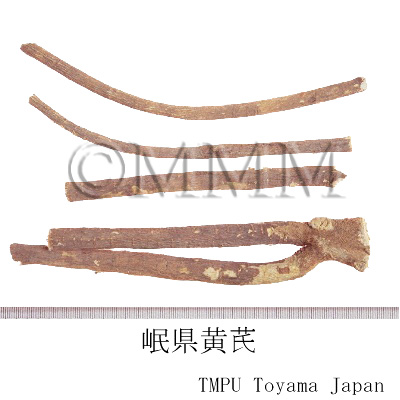Crude drug sample data base
※Click on the image to enlarge it.
The capital city, provincial capital city or the representative
location of its administrative area is indicated.
location of its administrative area is indicated.
36.061089
103.83430299999998
Production area information
People's Republic of China,Gansu Prov.
https://ethmed.toyama-wakan.net/img/pin_san.png
34.58088499999999
105.72497999999996
Collection information
People's Republic of China,Tianshui
https://ethmed.toyama-wakan.net/img/pin_nyu.png
Scientific information data base
| Common name | 晋耆, Jinqi, Hedysari Radix (JP18, CP2020), Hedysarum Root (JP18), Manyinflorecenced Sweetvetch Root (CP2020) | |||||
|---|---|---|---|---|---|---|
| Synonyms | 紅耆, 川耆, 束黄耆 | |||||
| crude drug image |
| |||||
| Original plant name | Hedysarum polybotrys Hand.-Mazz. | |||||
| original plant image |
| |||||
| Family name | Leguminosae | |||||
| Used part | root | |||||
| Official compendium | JP XVIII, CP (2020 ed.) | |||||
| Clinical application | As a tonic, cardiotonic, diuretic and anhidrotic, jinqi is applied for valetudinarianism, dystrophy, dysfunction of sweating and acute or chronic nephritis. | |||||
| Medical system | Traditional Chinese medicine | |||||
| Drug effect in traditional medicine | Traditional classification | Drugs for replenishing Qi (vital energy) | ||||
| Beneficial effect | [Property and Flavor] Mild warm; sweet. [Meridian Tropism] Lung and spleen meridians. [Actions] To tonify qi and upraise yang, secure the exterior, check sweating, promote urination, alleviate edema, engender fluid, nourish the blood, move stagnation, relieve impediment, expel toxin and pus, promote wound healing and tissue regeneration. [Indications] Qi deficiency and lack of strength, reduced food intake, sloppy stool, sunken middle qi, chronic diarrhea, prolapse of the rectum, bloody stool, menstrual flooding and spotting, exterior deficiency with spontaneous sweating, qi deficiency edema, interior heat wasting-thirst, blood deficiency and sallow complexion, hemiplegia, arthralgia, numbness, abscesses and cellulitis difficult to suppurate and perforate, or difficult to heal. | |||||
| DNA sequence | AF239715; Traditioal Medical & Parmaceutical Database. | |||||
| Disease | Lack of energy, Fatigable, Shortness of breath, Anorexia, Chill, Descent of the uterus, Chronic diarrhea, Hematochezia, Irregular vaginal bleeding, Numbness, Partial paralysis, Night sweats, Pyogenic dermatosis, Edema, Spontaneous sweating, Proctoptosis, Polyposia, Polyuria, Internal bleeding, Acute nephritis, Proteinuria, Diabetes mellitus | |||||
| Related drugs | Huangqi (Astragali Radix) | |||||
| References | JP18: The 18th edition of the Japanese Pharmacopoeia. CP2020: Pharmacopoeia of the People's Republic of China 2020 edi. | |||||
| Remarks | It is more appreciated and expensive than "Huangqi" (Astragali Radix) in China. In Japan, however, it is excluded under the term of "Huangqi" in the Japanese Pharmacopoeia. | |||||
| Last renewal date | 2021/09/27 | |||||










